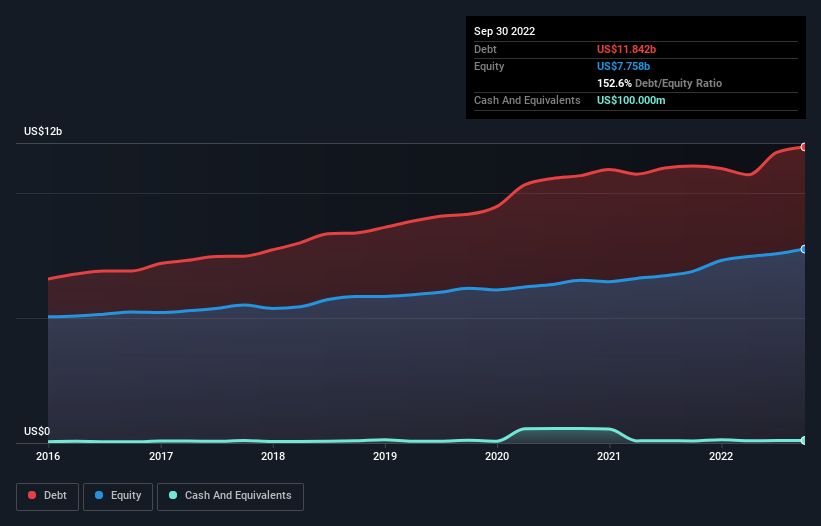- United States
- /
- Water Utilities
- /
- NYSE:AWK
Is American Water Works Company (NYSE:AWK) A Risky Investment?

Howard Marks put it nicely when he said that, rather than worrying about share price volatility, 'The possibility of permanent loss is the risk I worry about... and every practical investor I know worries about.' So it might be obvious that you need to consider debt, when you think about how risky any given stock is, because too much debt can sink a company. We note that American Water Works Company, Inc. (NYSE:AWK) does have debt on its balance sheet. But should shareholders be worried about its use of debt?
Why Does Debt Bring Risk?
Debt and other liabilities become risky for a business when it cannot easily fulfill those obligations, either with free cash flow or by raising capital at an attractive price. Part and parcel of capitalism is the process of 'creative destruction' where failed businesses are mercilessly liquidated by their bankers. While that is not too common, we often do see indebted companies permanently diluting shareholders because lenders force them to raise capital at a distressed price. Having said that, the most common situation is where a company manages its debt reasonably well - and to its own advantage. The first thing to do when considering how much debt a business uses is to look at its cash and debt together.
See our latest analysis for American Water Works Company
What Is American Water Works Company's Net Debt?
As you can see below, at the end of September 2022, American Water Works Company had US$11.8b of debt, up from US$11.1b a year ago. Click the image for more detail. And it doesn't have much cash, so its net debt is about the same.

How Strong Is American Water Works Company's Balance Sheet?
We can see from the most recent balance sheet that American Water Works Company had liabilities of US$2.13b falling due within a year, and liabilities of US$17.2b due beyond that. Offsetting this, it had US$100.0m in cash and US$631.5m in receivables that were due within 12 months. So it has liabilities totalling US$18.6b more than its cash and near-term receivables, combined.
This deficit is considerable relative to its very significant market capitalization of US$28.8b, so it does suggest shareholders should keep an eye on American Water Works Company's use of debt. Should its lenders demand that it shore up the balance sheet, shareholders would likely face severe dilution.
In order to size up a company's debt relative to its earnings, we calculate its net debt divided by its earnings before interest, tax, depreciation, and amortization (EBITDA) and its earnings before interest and tax (EBIT) divided by its interest expense (its interest cover). This way, we consider both the absolute quantum of the debt, as well as the interest rates paid on it.
American Water Works Company has a rather high debt to EBITDA ratio of 6.0 which suggests a meaningful debt load. But the good news is that it boasts fairly comforting interest cover of 3.5 times, suggesting it can responsibly service its obligations. Given the debt load, it's hardly ideal that American Water Works Company's EBIT was pretty flat over the last twelve months. There's no doubt that we learn most about debt from the balance sheet. But it is future earnings, more than anything, that will determine American Water Works Company's ability to maintain a healthy balance sheet going forward. So if you're focused on the future you can check out this free report showing analyst profit forecasts.
Finally, a business needs free cash flow to pay off debt; accounting profits just don't cut it. So we clearly need to look at whether that EBIT is leading to corresponding free cash flow. During the last three years, American Water Works Company burned a lot of cash. While investors are no doubt expecting a reversal of that situation in due course, it clearly does mean its use of debt is more risky.
Our View
On the face of it, American Water Works Company's net debt to EBITDA left us tentative about the stock, and its conversion of EBIT to free cash flow was no more enticing than the one empty restaurant on the busiest night of the year. Having said that, its ability to grow its EBIT isn't such a worry. We should also note that Water Utilities industry companies like American Water Works Company commonly do use debt without problems. Looking at the bigger picture, it seems clear to us that American Water Works Company's use of debt is creating risks for the company. If all goes well, that should boost returns, but on the flip side, the risk of permanent capital loss is elevated by the debt. The balance sheet is clearly the area to focus on when you are analysing debt. But ultimately, every company can contain risks that exist outside of the balance sheet. For example American Water Works Company has 3 warning signs (and 1 which is significant) we think you should know about.
If, after all that, you're more interested in a fast growing company with a rock-solid balance sheet, then check out our list of net cash growth stocks without delay.
If you're looking to trade American Water Works Company, open an account with the lowest-cost platform trusted by professionals, Interactive Brokers.
With clients in over 200 countries and territories, and access to 160 markets, IBKR lets you trade stocks, options, futures, forex, bonds and funds from a single integrated account.
Enjoy no hidden fees, no account minimums, and FX conversion rates as low as 0.03%, far better than what most brokers offer.
Sponsored ContentNew: Manage All Your Stock Portfolios in One Place
We've created the ultimate portfolio companion for stock investors, and it's free.
• Connect an unlimited number of Portfolios and see your total in one currency
• Be alerted to new Warning Signs or Risks via email or mobile
• Track the Fair Value of your stocks
Have feedback on this article? Concerned about the content? Get in touch with us directly. Alternatively, email editorial-team (at) simplywallst.com.
This article by Simply Wall St is general in nature. We provide commentary based on historical data and analyst forecasts only using an unbiased methodology and our articles are not intended to be financial advice. It does not constitute a recommendation to buy or sell any stock, and does not take account of your objectives, or your financial situation. We aim to bring you long-term focused analysis driven by fundamental data. Note that our analysis may not factor in the latest price-sensitive company announcements or qualitative material. Simply Wall St has no position in any stocks mentioned.
About NYSE:AWK
American Water Works Company
Through its subsidiaries, provides water and wastewater services in the United States.
Average dividend payer with acceptable track record.
Similar Companies
Market Insights
Community Narratives



